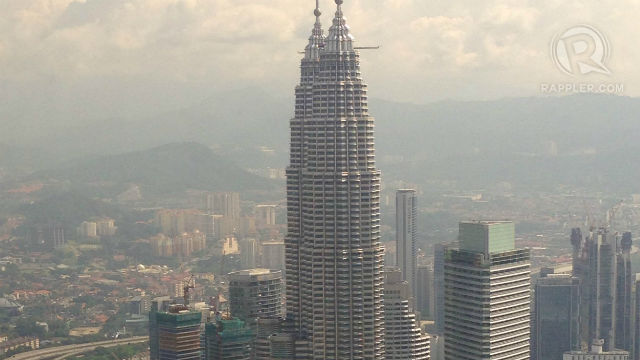SUMMARY
This is AI generated summarization, which may have errors. For context, always refer to the full article.

As its world-famous tourism campaign goes – this is Malaysia, truly Asia.
A multicultural state, Malaysia gained independence from British rule in 1957. Back then, it was known as the “Federation of Malaya” composed only of 11 states.
In 1963, Malaya welcomed Singapore, Sarawak and North Borneo into its fold, and from then on, the country was known as “Malaysia.”
As an independent state, Malaysia’s early stages of post-colonial history were marred by conflict.
Soon after Singapore, Sarawak and North Borneo joined it, Indonesia launched unsuccessful attacks in Borneo as a sign of protest.
Singapore eventually withdrew from Malaysia in 1965 due to political conflict between ruling parties in the two states.
As a young state grappling with a sense of national identity, racial tensions over perceived social inequalities between the Chinese, who controlled most of the business and trade industry, and Malays simmered for years. Conflict erupted in the May 1969 riot in Kuala Lumpur, which killed hundreds.
Despite dents in Malaysia’s history, the country has since become a frontrunner in Southeast Asia due in part to its relatively stable economy.
Political landscape
While the country has a traditional king, the prime minister, in reality, is the most powerful political figure. Malaysia’s political system is a federal monarchy – a trace of its British colonial past.
Since its independence, the ruling Alliance Party of Malaysia and its successor since 1973, the Barisian Nasional, has dominated the elections. Malaysia’s largest political party, the United Malays National Organization, is a founding member of the Barisian Nasional coalition.
Meanwhile, the Coalition of Hope makes up the opposition, along with other smaller parties.
Mohamad Mahathir, who served as Malaysia’s prime minister for 22 years until his retirement in 2003, is credited for leading the country’s rise as one of the most robust economies in Southeast Asia. His administration, however, was hounded by allegations of human rights abuse.
Culture
Malaysia is home to about 30 million people as of 2015. Based on the 2010 census, 67.4% of Malaysian citizens are Malay, 24.6% are Chinese and 7.3% are Indians, while other nationalities comprise the rest.
The official language is Malay, although English is also used.
When it comes to religion, the matter on whether or not Malaysia is an Islamic state remains to be the subject of debate. While the constitution entrenched Islam as the official state religion, other religions are also free to express their faith.
More than half of Malaysian are Muslims, followed by Buddhists, Christians, Hindus, Confucians, Taoists and other Chinese faiths.
Economy
Arguably the most photographed structure in Malaysia, the Petronas Twin Towers serves as the symbol of Malaysia’s transformation from an agriculture-based economy into a new industrial economy that is driven by manufacturing.
Malaysia has the 3rd largest economy in Southeast Asia, next only to Thailand and Indonesia.
International trade plays a key role in its economy, and its main exports include: semiconductors and electronic equipment, palm oil, and petroleum and liquefied natural gas.
Malaysia is considered as one of the world’s most important Islamic finance center, with Islamic banking expected to account for 40% of Malaysia’s financial sector by 2020.
ASEAN 2015 and Malaysia’s foreign policy
Malaysia is one of the founding members of the Association of Southeast Asian Nations (ASEAN).
Malaysia has made ASEAN the “cornerstone” of its foreign policy, placing regional cooperation as a major priority.
For Malaysia, ASEAN 2015 would not only promote economic stability but also guarantee security.
The 2013 siege of Lahad Datu by followers of a sultan staking the Philippines’ dormant claim to Sabah showed vulnerabilities in Malaysia’s border security.
While Malaysia’s land dispute with Brunei over Limbang has been resolved, a standing claim over the Spratly Islands with China, Taiwan, Vietnam and Brunei has yet to reach a solution.
Although Malaysia has won its claim over Ligitan and Sipadan Islands, which are also being claimed by Indonesia and the Philippines, the maritime boundaries in the Celebes Sea remains to be in dispute.
Malaysia says it believes the existence of ASEAN paves the way for strengthening bilateral relations, reducing risks to security.
In first quarter of 2014, Malaysia was put under international spotlight when a Malaysian Airlines flight bound for Beijing mysteriously disappeared.
Three years after it vanished, the search for the plane has been called off, leaving unsolved a mystery in the aviation age.
In 2017, Malaysia became embroiled in a diplomatic tiff with North Korea after the half-brother of North Korean leader Kim Jong-Un was murdered at Malaysia’s main airport with the banned VX nerve agent. – Rappler.com
Add a comment
How does this make you feel?
There are no comments yet. Add your comment to start the conversation.